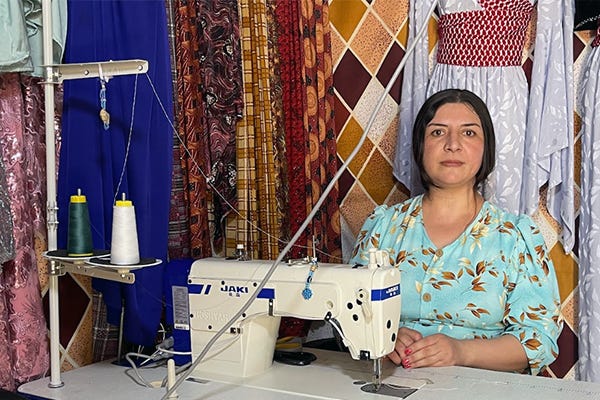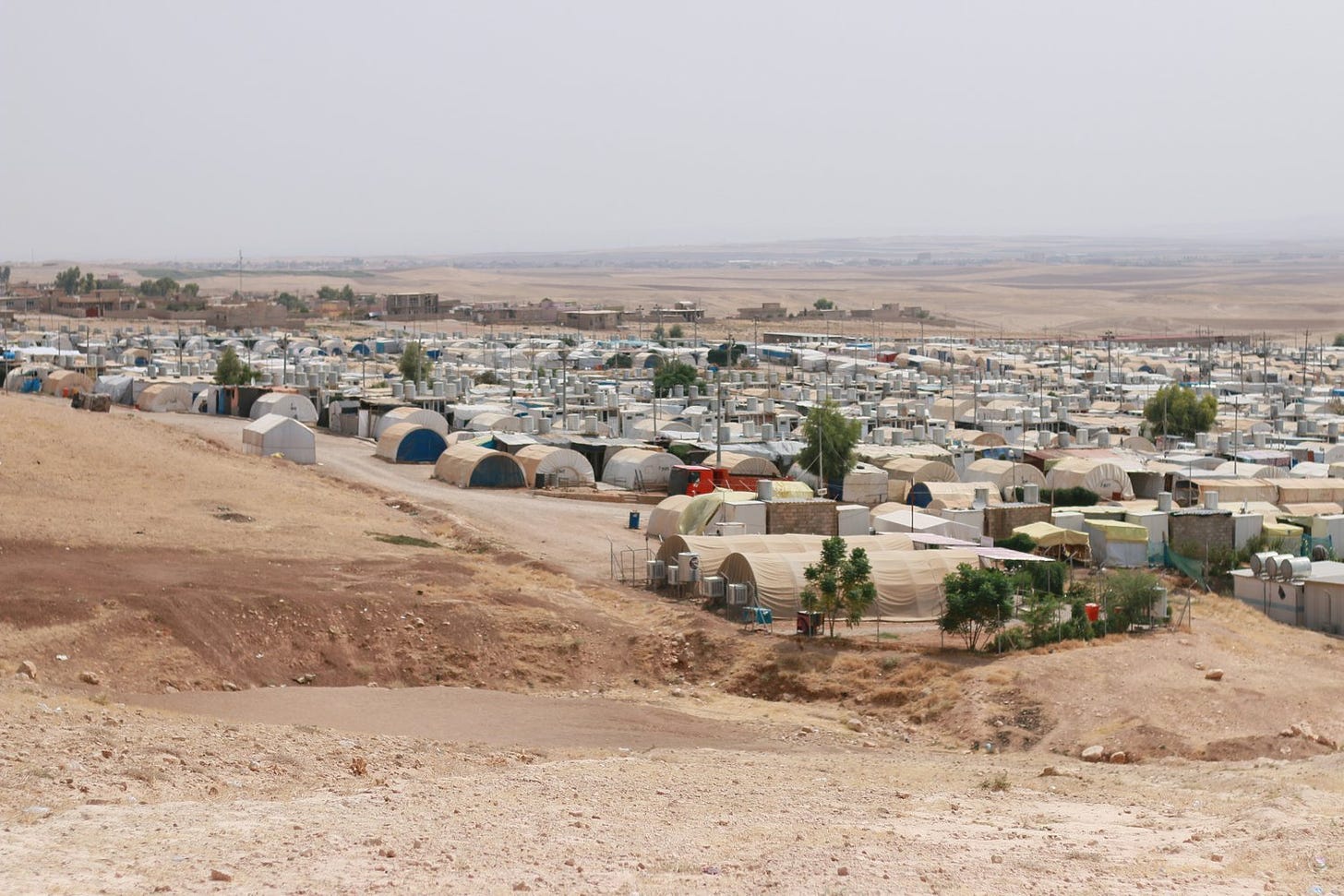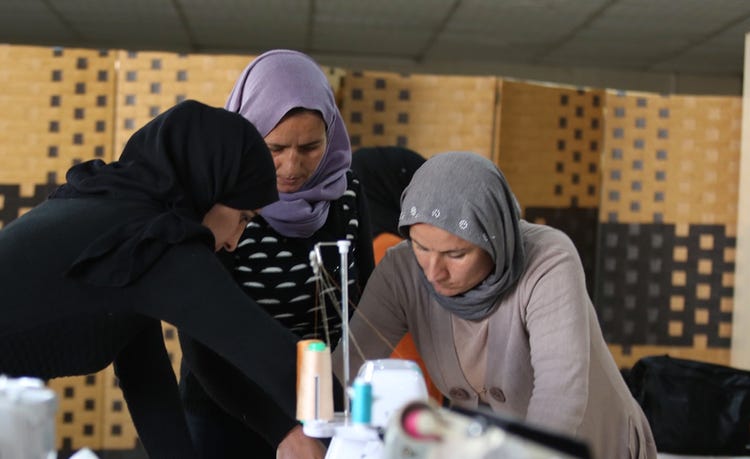Forgotten Women Defying the Odds
As funding falls, The Lotus Flower is finding ways to offer sustainable support for displaced women across the Kurdistan Region of Iraq
There’s an eerie quiet on the streets of Essyan Camp. One of the largest refugee camps in the Kurdistan Region of Iraq, this was once a hub of activity, with aid and development agencies from across the world offering support and services to thousands of internally displaced people, many of them Yazidis forced from their homes by ISIS in 2014.
Today, the atmosphere is different. Some people have moved on, emigrating to Europe or returning home to Sinjar and other areas that were overrun by ISIS at the height of their caliphate. Yet the camp remains one of the largest in the region, with families afraid to return to areas where limited infrastructure and a volatile security situation offer little hope for the future.
“The Iraqi government is encouraging people to return home, but there are still a lot of safety concerns for people whose areas are being managed by militias,” says Vian Ahmed, regional director at The Lotus Flower. Their only alternative is to stay, despite declining levels of support as the international community steps back, with very few organizations now operating in camps and host communities.
Ahmed has been working in the Kurdish refugee camps since 2015, when money was pouring in as the international community prioritized the fight against ISIS and the refugee crisis in Syria and Iraq. She joined The Lotus Flower when the foundation launched in 2017, as the international community shifted focus, despite the enormous need for ongoing support.
Since then, resources have dwindled to a fraction of the funding required to assist over 1 million Iraqis who are internally displaced, including around 160,000 living in 23 refugee camps across Kurdistan. On a recent visit to Essyan Camp, she was painfully aware of the change. Health, education, livelihood support, and other services have always been stretched thin in this conflict, but these days, they are almost non-existent.
“If you visited the camps five years ago compared to today, you can see the contrast. There are very few aid organizations, and most don’t operate fully in the camps; they just visit once or twice a month,” she says. Those that do still have a presence are phasing out support with the Iraqi government pushing to close all camps across Kurdistan and return people to their homes. Many of the camps in federal Iraq have already been closed down.
The Lotus Flower is among a handful of organizations continuing to provide services to refugees and IDPs in camps and host communities across Kurdistan. Set up by former child genocide survivor Taban Shoresh, they support women and girls affected by conflict and provide the tools they need to rebuild their lives.
An Innovation Hub grant has helped to support their latest project, the Women’s Business Incubation program, which empowers home-based female entrepreneurs with financial grants that allow them to foster sustainable growth of their businesses. “The Lotus Flower has responded directly to the needs of the women in their community with this project, which helps those who have already established a functioning business to sustain and build on the progress they have made,” says Faisal Al Mutar.
“Unfortunately, women and girls continue to face a huge number of challenges while living in displacement, but having the means to run a small business can have a powerful impact on their ability to flourish and grow.”
Amina Khalaf Hamed, 28, lives in a tent in Sharya outside the camp and used her sewing skills to help support her parents and six siblings. When her mother was diagnosed with cancer, she had to sell her tools to pay for medical treatment, leaving the family with little to live on. She was among ten women selected for a Women’s Business Incubation grant, allowing her to buy back the tools she needs to expand her business and, in the future, offer opportunities to other girls looking to support their families.
“The situation for women is still very challenging, so this project has come at a good time,” says Ahmed. “Many women face financial difficulties as well as stigma when it comes to setting up a business, so this project really meets the needs of the community,” she adds.
Home-based businesses like sewing, baking, and jewelry-making sidestep some of these barriers and are often more accessible for women living in conservative communities, where they typically have a more restricted role in society. Alongside the financial benefits of enabling women to work from home, many report improvements in other areas of their lives. “A lot of women say that their income changes their husband’s perspective, reducing cases of domestic violence in some instances,” Ahmed says.
Attitudes have shifted over the past decade, with many more women now willing to report gender-based violence. Ahmed recalls being laughed at by women attending a legal rights awareness session in Qadia Camp in 2015 when she explained that husbands do not have the right to beat and assault their wives. Now, they see more women reporting issues and fewer willing to accept violence as part of family life. However, there are also more avenues for abuse. “Online harassment has created other opportunities for violence against women and girls,” she adds.
Projects like the Women’s Business Incubator help to empower women and change their status in the family, boosting their confidence and giving them a platform to grow. Ahmed’s main focus now is securing further funding to involve more women in the project. She has a pile of applications from suitable candidates who need a small sum to get home-based businesses off the ground. “As well as helping her family financially, running a small business allows these women to heal and grow,” she says.
This article was written by Olivia Cuthbert.






